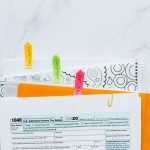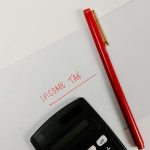To defend your home office deduction in an audit, you’ll need specific documentation. Start with evidence showing your home office is used regularly and exclusively for business—measure your space and keep utility bills, lease or mortgage documents, and insurance papers. Gather receipts for expenses, and take photos of your workspace. Also, track the business use of personal property. Organized records not only prepare you for audits but also maximize your deductions. There’s more important info to contemplate.
Table of Contents
Key Takeaways
- Document the size of your home office to establish the space used for business purposes.
- Keep lease or mortgage documents to verify home ownership or rental agreements.
- Collect utility bills to prove expenses directly related to your home office.
- Maintain a detailed log of business use of personal property, including dates and tasks.
- Organize all receipts and photos of your office space to support your deduction claims.
Understanding the Home Office Deduction Eligibility Criteria
To qualify for the home office deduction, you need to meet specific criteria that the IRS outlines.
First, your home office must be used regularly and exclusively for business purposes. This means you can’t use the space for personal activities.
Second, the area should be your principal place of business, or a place where you meet clients or customers.
You’ll also need to determine the size of your workspace, as the deduction often depends on the square footage.
Finally, remember that you can’t claim the deduction if you rent a space outside your home, and your home office must be part of your primary residence.
Meeting these requirements will help guarantee you can take advantage of the deduction.
Essential Records for Home Office Space
While maintaining a home office can be rewarding, keeping essential records is crucial for maximizing your deduction. You need to document your workspace details to support your claim. Start by measuring your home office area and noting its total square footage. Then, keep copies of your lease or mortgage documents.
Here’s a helpful table to guide you:
| Record Type | Purpose |
|---|---|
| Home Office Measurement | Establishes space used |
| Lease/Mortgage Document | Confirms ownership or rent |
| Utility Bills | Proves expenses related to space |
| Insurance Documents | Shows coverage for your workspace |
| Photos of Office Space | Visual evidence of dedicated area |
These records can greatly strengthen your position during an audit.
Documenting Home Office Expenses
When it comes to documenting your home office expenses, tracking your costs accurately is key.
You’ll need to gather the right supporting documents to back up your claims.
Let’s explore effective expense tracking methods and what documents you should keep on hand.
Expense Tracking Methods
Documenting home office expenses can seem challenging, but effective expense tracking methods make the process manageable.
Start by using a dedicated app or software designed for expense tracking; this can simplify data entry and organization. Alternatively, you can maintain a spreadsheet to record expenses, categorizing them for easy reference.
Make it a habit to log expenses regularly—daily or weekly—to avoid a backlog. Don’t forget to note the purpose of each expense, as this will help justify your deductions later.
If you prefer a more traditional approach, keep physical receipts in a labeled folder. Whatever method you choose, consistency is key to ensuring you have accurate records when it’s time to claim your home office deduction.
Required Supporting Documents
To successfully claim your home office deduction, you need to gather specific supporting documents that validate your expenses.
These documents serve as proof during an audit, ensuring you can substantiate your claims. Here’s what you’ll need:
- Receipts for all home office-related expenses, such as utilities, internet, and office supplies.
- Photos of your home office space, clearly showing the area dedicated to your work.
- Calculations showing how you determined the percentage of your home used for business, based on square footage or room counts.
Tracking Business Use of Personal Property
Since you’re using personal property for business purposes, tracking its usage is essential for maximizing your home office deduction.
Start by documenting how often and for what purposes you use your personal property, like equipment or furniture, for your business. Keep a detailed log that notes dates, times, and specific tasks performed.
If you share items between personal and business use, calculate the percentage of time used for business to determine your deductible amount.
You might also want to take photos or maintain receipts to provide additional proof.
This method not only helps you stay organized but also strengthens your position if you face an audit, ensuring you have concrete evidence to support your claims.
Keeping Evidence of Utilities and Maintenance Costs
While managing your home office, keeping track of utilities and maintenance costs is essential for claiming your deduction effectively. Documenting these expenses can provide you with the necessary evidence during an audit.
Here are some key items you should focus on:
- Utility Bills: Save copies of your electricity, water, and internet bills, highlighting the portions used for your office space.
- Maintenance Receipts: Keep receipts for repairs and maintenance services, such as plumbing or electrical work, that benefit your workspace.
- Home Office Percentage: Calculate the percentage of your home dedicated to your office to determine the deductible amount for shared expenses.
Importance of Accurate Record-Keeping Practices
Keeping your financial records organized is essential for maximizing your home office deduction.
When you track your business expenses accurately, you make it easier to claim what you’re entitled to.
Let’s explore how effective record-keeping can benefit you and your tax situation.
Organizing Financial Records
Accurate record-keeping is essential for anyone claiming the home office deduction. By organizing your financial records, you guarantee you can easily access the documentation needed if you face an audit.
Here are some effective ways to keep your records in order:
- Use digital tools: Consider software or apps that streamline document management, making it easier to track and store your records.
- Create a filing system: Organize receipts and documents by category, such as utilities, supplies, and maintenance, so you can find them quickly.
- Regularly review your records: Set a schedule to check your documents, guaranteeing everything is up-to-date and accurately reflects your home office expenses.
Staying organized will save you time and stress when it’s time to justify your deduction.
Tracking Business Expenses
Tracking business expenses is essential for maximizing your home office deduction and maintaining financial health. Accurate record-keeping not only helps you identify deductible expenses but also strengthens your position in case of an audit. Here’s a simple breakdown of common expense categories you should track:
| Expense Category | Examples |
|---|---|
| Office Supplies | Paper, ink, pens |
| Utilities | Electricity, internet |
| Rent or Mortgage | Home office portion |
| Equipment | Computers, furniture |
| Travel Expenses | Mileage, lodging for business |
Frequently Asked Questions
How Can I Prove My Home Office Is Used Exclusively for Business?
To prove your home office’s exclusive business use, keep detailed records of your activities, designate a specific area solely for work, and avoid personal use. Photos and receipts can also strengthen your case during audits.
What if My Home Office Is Also Used for Personal Activities?
If you use your home office for personal activities, it complicates the deduction. You should track the percentage of business use versus personal use, ensuring you only claim the portion directly related to your work.
Can I Claim Home Office Expenses if I’m an Employee?
Yes, you can claim home office expenses if you’re an employee, but it depends on your employer’s policies and the nature of your work. Just keep accurate records and guarantee your workspace is dedicated.
What Happens if I Don’T Have All My Receipts?
If you don’t have all your receipts, you might struggle to prove your expenses. It’s essential to keep accurate records, as missing documentation can lead to denied deductions or potential issues during an audit.
How Long Should I Keep Home Office Documentation?
You should keep your home office documentation for at least three years after filing your tax return. This timeframe helps guarantee you’re prepared for any potential audits or questions regarding your deductions.




